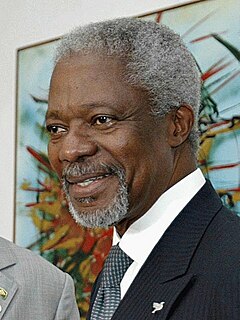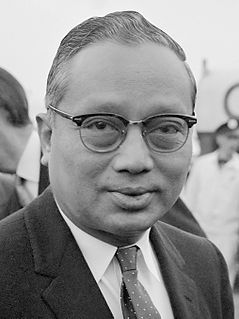
The United Nations Secretariat is one of the six major organs of the United Nations, with the others being (a) the General Assembly; (b) the Security Council; (c) the Economic and Social Council; (d) the defunct Trusteeship Council; and (e) the International Court of Justice. The Secretariat is the United Nations' executive arm. The Secretariat has an important role in setting the agenda for the UN's deliberative and decision making bodies of the UN, and the implementation of the decision of these bodies. The Secretary-General, who is appointed by the General Assembly, is the head of the secretariat.

The Secretary-General of the United Nations is the head of the United Nations Secretariat, one of the six principal organs of the United Nations. The Secretary-General serves as the chief administrative officer of the United Nations. The role of the United Nations Secretariat, and of the Secretary-General in particular, is laid out by Chapter XV of the United Nations Charter.

United Nations General Assembly Resolution 194 was adopted on December 11, 1948, near the end of the 1948 Arab–Israeli War. The Resolution defined principles for reaching a final settlement and returning Palestine refugees to their homes. It resolved that “refugees wishing to return to their homes and live at peace with their neighbours should be permitted to do so at the earliest practicable date, and that compensation should be paid for the property of those choosing not to return and for loss of or damage to property which, under principles of international law or equity, should be made good by the Governments or authorities responsible.”

The United Nations Security Council "veto power" refers to the power of the permanent members of the UN Security Council to veto any "substantive" resolution. A permanent member's abstention or absence does not prevent a draft resolution from being adopted. This veto power does not apply to "procedural" votes, as determined by the permanent members themselves. A permanent member can also block the selection of a Secretary-General, although a formal veto is unnecessary since the vote is taken behind closed doors.

United Nations Security Council Resolution 134, adopted on April 1, 1960, was passed after a complaint by twenty-nine Member States regarding "the situation arising out of the large-scale killings of unarmed and peaceful demonstrators against racial discrimination and segregation in the Union of South Africa". The Council recognized that the situation was brought about by the policies of the government of the Union of South Africa and that if these policies continued they could endanger international peace and security.
United Nations Security Council Resolution 143 was adopted on July 14, 1960. After a report by the Secretary-General, acting under Article 99 of the Charter and a request for military assistance by the President and Prime Minister of the Republic of the Congo (Leopoldville) to protect its territory, the Council called upon Belgium to withdraw its troops from the territory and authorized the Secretary-General to take the necessary steps to provide the Government with such military assistance that the national security forces may be able to meet fully their tasks. The Council asked the Secretary General to report to the Security Council as appropriate.
The Dag Hammarskjöld Medal is a posthumous award given by the United Nations (UN) to military personnel, police, or civilians who lose their lives while serving in a United Nations peacekeeping operation. The medal is named after Dag Hammarskjöld, the second Secretary-General of the United Nations, who died in a plane crash in what is now Zambia in September 1961.

United Nations Security Council resolution 1121, adopted unanimously on 22 July 1997, after recalling that the maintenance of international peace and security was one of the main purposes of the United Nations, the Council established the Dag Hammarskjöld Medal, named after the second Secretary-General Dag Hammarskjöld, awarded posthumously to United Nations peacekeepers.

United Nations Security Council resolution 1250, adopted unanimously on 29 June 1999, after reaffirming all resolutions on the situation in Cyprus, particularly Resolution 1218 (1998), the Council addressed the Secretary-General Kofi Annan's mission of good offices in Cyprus.

United Nations Security Council resolution 1327, adopted unanimously on 13 November 2000, after recalling Resolution 1318 (2000) adopted at the Millennium Summit and receiving the Report of the Panel on United Nations Peacekeeping, the Council adopted a resolution concerning the improvement of its peacekeeping operations.

United Nations Security Council resolution 1342, adopted unanimously on 27 February 2001, after recalling all previous resolutions on Western Sahara, in particular resolutions 1108 (1997), 1292 (2000), 1301 (2000), 1309 (2000) and 1324 (2000), the Council extended the mandate of the United Nations Mission for the Referendum in Western Sahara (MINURSO) until 30 April 2001.

United Nations Security Council resolution 1358, adopted by acclamation at a closed meeting on 27 June 2001, having considered the question of the recommendation for the appointment of the Secretary-General of the United Nations, the Council recommended to the General Assembly that Mr. Kofi Annan be appointed for a second term of office from 1 January 2002, to 31 December 2006.

United Nations Security Council Resolution 1648, adopted unanimously on 21 December 2005, after considering a report by the Secretary-General Kofi Annan regarding the United Nations Disengagement Observer Force (UNDOF) and reaffirming Resolution 1308 (2000), the Council extended its mandate for a further six months until 30 June 2006.

United Nations Security Council Resolution 1733, adopted by acclamation at a closed meeting on December 22, 2006, after recognising the role of the Secretary-General of the United Nations, the Council paid tribute to Kofi Annan, whose term as Secretary-General would come to an end on December 31, 2006.
United Nations Security Council Resolution 1830 was unanimously adopted on 7 August 2008.
United Nations Security Council Resolution 1888 was unanimously adopted on 30 September 2009. It was introduced by United States Secretary of State Hillary Clinton, who also presided over the session. The resolution established the United Nations Special Representative on Sexual Violence in Conflict.
United Nations Secretary-General selection is the process of selecting the next Secretary-General of the United Nations. To be selected as Secretary-General, a candidate must receive the votes of at least 9 members of the United Nations Security Council, with no vetoes from permanent members. The Secretary-General is then appointed by a majority vote of the United Nations General Assembly.

A United Nations Secretary-General selection was held in 1961 to replace Dag Hammarskjöld after he was killed in a plane crash. After initial Soviet attempts to replace the Secretary-General with a troika, it was agreed that an Acting Secretary-General would be appointed for the remainder of Hammarskjöld's term. Within two weeks, U Thant of Burma emerged as the only candidate who was acceptable to both the Soviet Union and the United States. However, the superpowers spent another four weeks arguing over the number of Assistant Secretaries-General, before finally resolving their dispute by allowing Thant to decide for himself. Thant was then voted in unanimously for a term ending on 10 April 1963.













